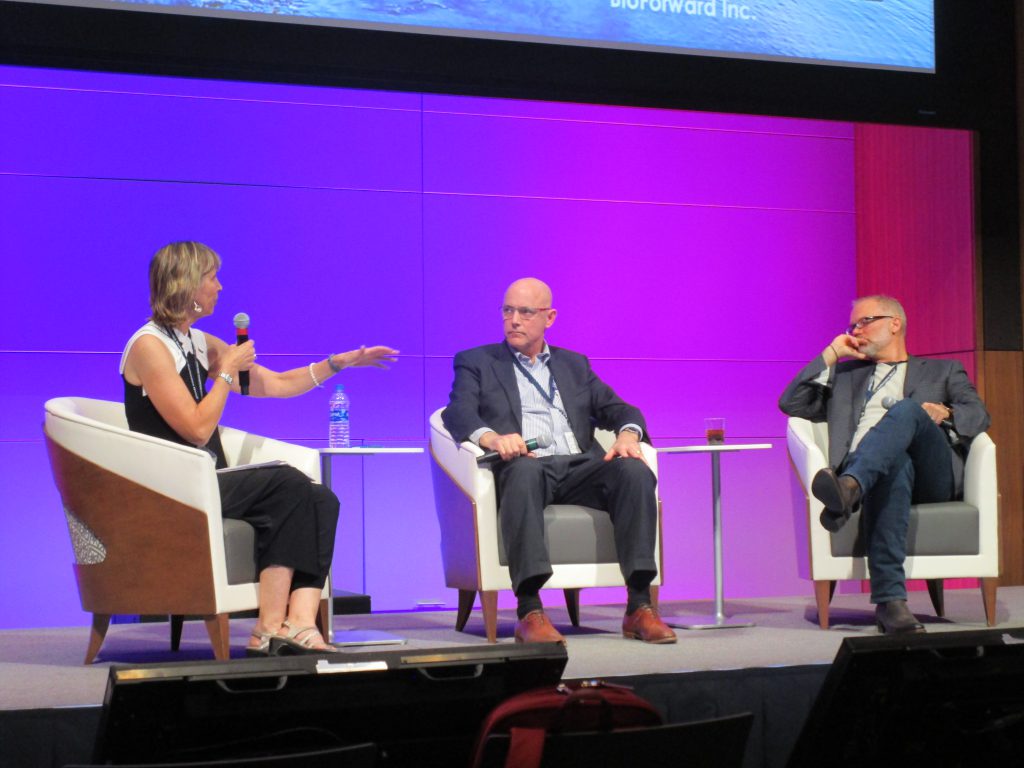Collaboration Key to Innovation in Milwaukee
Panelists at the startup-themed 5 Lakes Forum said the Great Lakes region has a lot going for it.

Lisa Johnson, CEO of BioForward Wisconsin, Kevin Boggs, director of the Medical College of Wisconsin’s Office of Technology Development and Erik Iverson, managing director of the Wisconsin Alumni Research Foundation. Photo by Dave Fidlin.
It might not have the pizzazz of being on one of the coasts, but Milwaukee and other cities across the Midwest have a number of favorable factors in the area of innovation, experts shared recently.
A three-person panel capped off this week’s annual 5 Lakes Forum with a discussion on the future of innovation in the Great Lakes Region. Startup Wisconsin and the Milwaukee Institute initiated the event.
The discussion largely focused on the biotech space, though the speakers pointed out many of the concepts could be applied elsewhere within the startup ecosystem.
“We are small,” Johnson said, referring specifically to the biotech industry she works within. “We can make things work. We can move quickly.”
Erik Iverson, managing director of the Wisconsin Alumni Research Foundation, or WARF, said the region tends to have a characteristic of openness, where innovators interact more freely with one another.
“Coordinating ourselves … is what sets us apart from the coasts,” Iverson said.
The word “collaboration” was mentioned frequently throughout the panel discussion.
“Collaboration is going to advance this state and this region,” Johnson said, pointing out how the innovators behind medicine and technology oftentimes work hand-in-glove with one another.
But when the rubber meets the road, Milwaukee and other Midwestern cities face hurdles compared to urban areas in other regions, particularly with investors.
“Biotech is scary to a lot of people, especially if you don’t know the area,” said Kevin Boggs, director of the Medical College of Wisconsin’s Office of Technology Development.
Iverson said clearly articulating innovations — in the biotech space and elsewhere in the startup realm — is of paramount important when it comes to reaching out to investors.
“Every investor has to make their own decisions,” Iverson said, pointing out they have unique, specific sets of objectives and theses.
Communication in such startups as the biotech space is crucial, Iverson said, because of the intensive amount of startup capital required just to get past “go.” Illustrating his point, Iverson said biotech companies typically need $1.5 million just to get an initial set of data.
This year’s 5 Lakes Forum was held May 14 at the Northwestern Mutual Tower and Commons in downtown Milwaukee.
The daylong event also included talks from a number of other nationally recognized innovators and investors in the startup scene.
Among them: Roy Bahat, head of Bloomberg Beta, Randy Knaflic, an angel investor, and Dan Reed, managing director of American Family Ventures.
If you think stories like this are important, become a member of Urban Milwaukee and help support real independent journalism. Plus you get some cool added benefits, all detailed here.



















